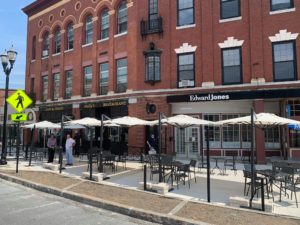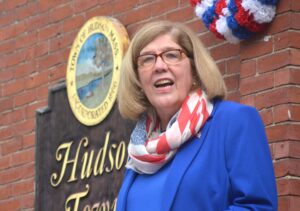
MARLBOROUGH/HUDSON – State Rep. Kate Hogan on Friday emphasized work to preserve some of the business support systems that have emerged during the COVID-19 pandemic.
Speaking at a legislative forum organized by the Assabet Valley Chamber of Commerce, Hogan, alongside State Sen. Jamie Eldridge, argued that these programs remain critical even while larger responses to the pandemic evolve.
“As our state transitions from pandemic to endemic [COVID-19], our state government has to continue to understand the importance of supporting our small businesses,” Hogan said.
Legislature nearing extension for outdoor dining, cocktails-to-go
This work extends to programs helping broader elements of “community infrastructure,” Hogan said, including schools, nonprofits, social service groups and municipal governments, all of which have been hit by the pandemic over the last two years.
Hogan further reflected on the crisis in her comments on Friday.
“We’ve all learned some important lessons from the pandemic and I think we’ve all been affected by the pandemic,” she said. “Whether we’ve lost someone to COVID or seen someone suffer the long term effects of what COVID can be, I know that all of us have been touched in many many ways.”

Through those struggles, she touted state and local pandemic responses that adapted to changing circumstances as the situation and the needs of community members also changed.
Changes to open meeting laws allowed remote meetings of public boards and commissions, Hogan noted. Those provisions have since been extended, in part due to widespread observations about improved accessibility in remote meetings.
“It has brought more people to the process,” Hogan said. “It has allowed more people access to the process.”
Hogan also noted the option of remote notarization services. Both that option and open meeting law changes have specifically been extended through at least July 15.
Of particular interest for the region’s restaurants, Hogan said that she and her legislative colleague are in the process of finalizing an extension to outdoor dining and cocktails-to-go permissions that became popular over the past two summers.
She said those permissions will continue if the legislature manages to pass its supplemental budget; something Hogan said she is confident will happen.
That means outdoor dining and cocktails-to-go will “very very likely” continue through at least April of next year.
Legislators talk grant programs, earmarks
Eldridge noted other ongoing legislative topics in his comments, with legislators also discussing, among other things, new grant opportunities aimed at reaching small businesses that hadn’t received relief through previous aid packages.
Those are administered through the Mass Growth and Capital Corporation, as are a separate set of grants aimed at benefiting businesses working in underserved markets.
Hogan invited business owners to contact her for more information.
Legislators, likewise, lauded their municipal colleagues, thanking them for their leadership during the pandemic.
“When our towns know and have a vision for where they want to go, it helps us to have that shared vision,” Hogan said.
“We are able to meet the moment so often by bringing the funding that our towns need,” she said.

Hogan and Eldridge highlighted recent earmarks that sent money to the region, including $400,000 for ongoing work at Hudson’s Riverwalk area near Cellucci Park on Houghton Street and $230,000 in funding for efforts to revitalize Hudson’s old armory as a community arts center.
“This will be the last jewel in the crown of that project,” Hogan said of the Riverwalk and larger coordinated work in the downtown area.
“The arts is just another critical piece to getting people to come downtown and spend money locally,” Eldridge said of the armory. “So, that’s exciting.”
COVID-19 lingers
These comments come as COVID-19 lingers, with case counts actually increasing in some locations as of last week.
The seven-day average of COVID-19 cases across Massachusetts had climbed to 680 on March 24 after falling below 600 daily cases on March 13.
Middlesex County, which includes Hudson and Marlborough, has recently led the state in daily case counts, recording 337 cases on March 25.
These case rates all remained substantially smaller, though, than the massive totals seen just a matter of weeks ago, when the daily average number of new cases in the state peaked at just over 23,000 on Jan. 8.
RELATED CONTENT
Hudson’s Fresh Start Furniture Bank celebrates ARPA funding amid surge in demand
Local communities to receive earmarks through state spending bill
Hudson moves forward with Riverwalk improvement project
Hudson Select Board approves ‘due diligence’ contract for Armory project











